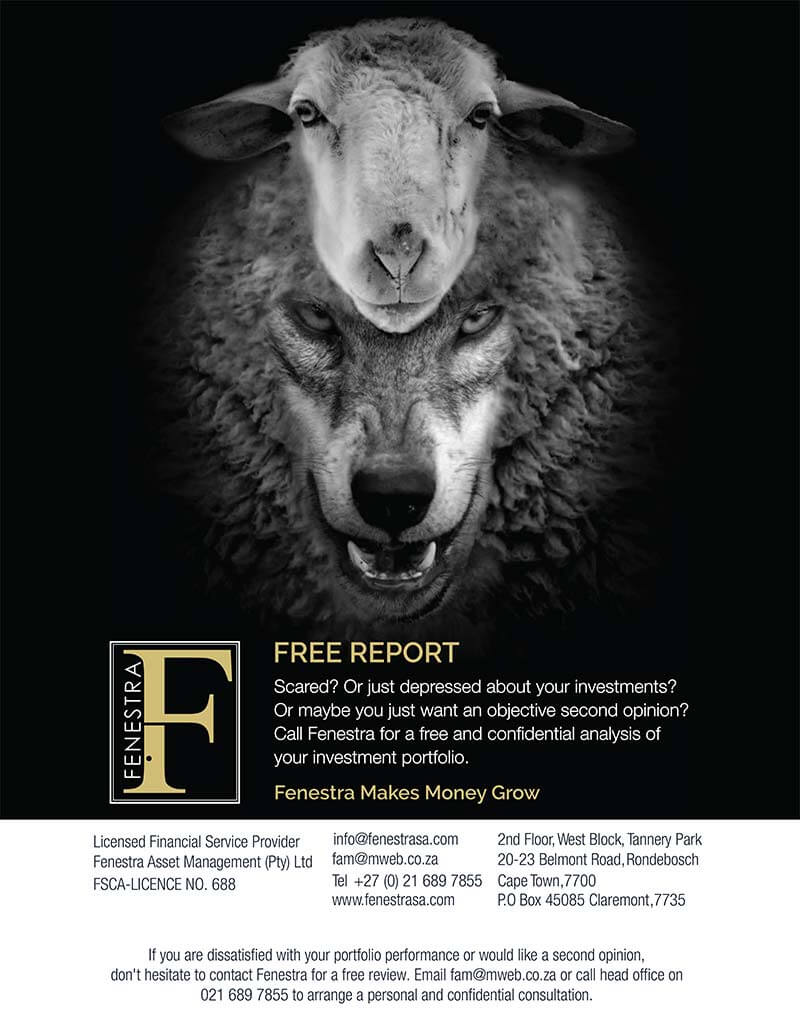A Winning Investment Strategy

The Government Schizophrenic
June 10, 2020
The Case For Gold
August 4, 2020“Keeping nimble and informed is key to a company’s success.”
Financial Mail
The coronavirus has thrown a curveball at investors as the world faces an uncertain financial future. But it’s also an opportunity to reflect on staying faithful to proven investments and investigating new horizons, says Fenestra Asset Management CEO and seasoned traveller, William Meyer.
The company’s founder views the economic crash caused by the Covid-19 pandemic through the wisdom and clarity gained from travel and the unfamiliar. “Travel is an incredible education, and education is your best hedge against calamity,” he says.
Meyer points to navigating the financial uncertainty through scrutiny of local and international businesses, coupled with “the need to protect capital, depending on geographic nimbleness, and storing capital in liquid and mobile form”.
Founded in 1992, the boutique investment company’s cherry-picking from “a small universe of local and international companies” avoided the catastrophic losses of African Bank, Brait, EOH, Steinhoff and Tongaat Hulett by refusing to offer them in its portfolios.
Tongaat, for example, was rejected because of the sugar company ’s inability to determine its own destiny.
Even without Tongaat’s leadership suffering corporate greed, any leadership team would struggle for returns from an agricultural commodity-based business. “Why get involved in a business where lines on its income statement are beyond the control of management?” asks Meyer.
“It goes back to the fundamental principle of management being honest and aligned with the interests of shareholders and stakeholders. If they aren’t, you’re going to get fleeced.”
Almost a decade ago, Meyer predicted that Apple would be the world’s first trillion-dollar company, when oil producer Exxon Mobil’s market capitalisation was seen as unassailable.
In August 2011, Meyer forecast that the party was just getting started for Apple.
“We predicted that, excluding Exxon Mobil, Apple would become the world’s most valuable technology company.
“The race then was between Apple and Amazon. Now the big debate is who will be the first $2-trillion company. At present Apple is neck and neck with Microsoft. We are again picking Apple to be the first $2-trillion company.
“That year, I also recommended Amazon shares, when they were trading at $185. They are now trading at $2,654. Apple’s shares were then trading at $50. They have now risen to $351.73. These shares have gained hundreds of percentage points.”
Apple is now the most valuable company in the world, worth $1.525-trillion. Microsoft is worth $1.489-trillion and Amazon is third at $1.324-trillion.
Warren Buffett’s investment company, Berkshire Hathaway, recently doubled its investment in Apple to 2.5%, making it the billionaire’s second-largest holding, surpassed only by its 10% Coca-Cola stake.
What it means:
Scrutinise global markets and diversify your portfolio to protect your money in uncertain times

Apple is a favourite of Fenestra through its flagship iPhone device, its interest in 5G network and its cutting-edge health technology, among other upsides.
“Whereas 94% of iPhone owners expect to buy another iPhone in the future, only 47% of Android users feel the same loyalty to the platform, and 42% of these say they are going to switch to the iPhone,” says Meyer.
Global market and business surveillance is an essential part of managing the offshore forex component of large – and small-scale South Africa investor portfolios.
“Firstly, it immediately reduces risk and volatility of the overall portfolio. If any one currency or country enters a bear market you will be protected by a diversified portfolio. Studying other countries helps you understand your own, and this in itself makes for better investment decisions,” says Meyer. “A prudent investor lives in the sun and keeps the money in the snow.”
The integration of global financial markets is changing the structure of the investment management industry.
Adding foreign investments to a portfolio, or tailoring the incentives offered to foreign investors, confronts the challenges posed by each country’s specific company and tax regimes, and accounting rules and restrictions.
“It is a bit tricky to do this as a hobby. As the saying goes, perhaps you shouldn’t try this at home,” says Meyer.
Meyer cautions against wholesale investment into dollar-denominated equity in case of US scenarios of high inflation and debt rates, preferring an investment spread across multiple currencies, including Denmark’s krone, the Swiss franc, and Australian and New Zealand dollars.
The Swiss franc’s performance against the rand “over the past few years has been nothing less than staggering”. “If you then pick choice companies on the New Zealand and Swiss exchanges you add a new dimension to your portfolio. New Zealand agriculture and sustainable energy accounts for 70% of its economy, so for every New Zealand dollar you buy, 70c is invested in these sectors, with great growth potential,” he says.
Fenestra’s strategy explains its impressive track record.
Corporate Report compiled by Guy Oliver
Sales Executive: Debbie Montanari
Financial Mail
EXTRAORDINARY PROFITS FROM ORDINARY SHARES * WINNING STOCK MARKET STRATEGIES
If you are not happy with your portfolio performance or would like a second opinion,
please do not hesitate to contact Fenestra for a free review of your portfolio.


